Note: This is the first of a two part series on how to calculate your returns versus the market.
One of the things I’ve found both difficult to do as an individual investor and largely ignored by the individual investing community is the ability compare how your investments have performed versus innumerable other methods that exist out there. The most common benchmark against which a portfolio’s performance is compared is the “market”, and more often than not, the S&P 500 index. (This is not necessarily always the right benchmark to use, but that topic will be saved for a later discussion.)
Ask someone if they’ve beaten the market, and chances are, you’ll be told they have, or perhaps that they don’t know (magically, it seems no one ever underperforms the market). Institutional investors have sophisticated setups that can measure their performance against a slew of benchmarks, but as an individual investor, how would you go about determining your portfolio’s performance vs. the S&P? A while ago, I sat down in front of a big Excel sheet to try, only to realize that my transactions were bought here and there, at different points in time, and money flowed in and out. Since my investment amounts varied at any given point, I couldn’t simply find my return by taking my end amount and divide by my beginning amount over a particular period of time.
Yahoo! Finance’s historical prices link
Luckily for individual investors, internet sources like Yahoo! Finance have made data much more readily available. One underutilized resource there is the ability to download historical prices for most equities and even indices, which can be found on the left sidebar as a menu item on the “Quotes & Info” page that appears after entering a stock symbol. Yahoo gives you the ability to download historical prices on a daily, weekly, or monthly basis, and even adjusts for dividends in the “Adjusted Prices” column.
Using SPY as a proxy
I decided to use SPY, an ETF that tracks the S&P 500 Composite Stock Price Index in lieu of the DJIA or even the S&P 500 index itself. I had a couple of reasons for doing so: first, SPY is a real and viable investment vehicle that does a good job of tracking the S&P 500 index, whereas indices are theoretical constructs that you can’t actually invest in directly; second, investors in SPY are paid dividends, and the historical prices listed in Yahoo! Finance’s automatically adjust for these, whereas no such thing exists or is adjusted for in an index. In addition, chose SPY over, say, DIA, an ETF that tracks the DJIA, simply out of custom, since the S&P 500 tends to be the benchmark that represents “the market” these days.
These two things, along with your own portfolio information, allow you to track your performance versus the market. Can you figure out how?
***************************************************
Look Good at Work and Become Indispensable Become an Excel Pro and Impress Your Boss

***************************************************


The pitfalls and dangers of target retirement funds »
[…] There’s less transparency: Some of these target retirement funds “trade” using a symbol (for example, Fidelity Freedom Funds all take the form of “FFFFx”), but some of them, like the ones offered by a previous employer, don’t have a trading symbol at all. I’m not one to constantly watch my investments, but suppose once a year I’d like to make sure my investments are performing well versus the market or some other benchmark such as a plain-jane mutual fund. I certainly can’t do that as easily as I could with mutual funds or stocks. […]
Market Software Stock Trading
Online Stock Trading…
1. Online share trading is not a child’s play. You can trade for as low as $1.5 at the click of a mouse but that doesn’t ensure profitability. A wise investment decision is the trick of the trade. Consult your online stock broker before buying or sel…